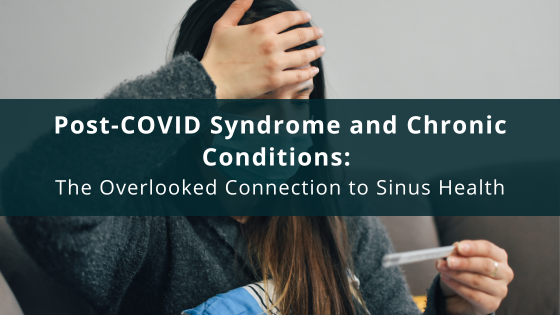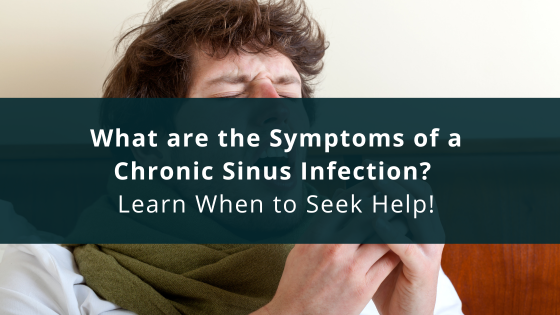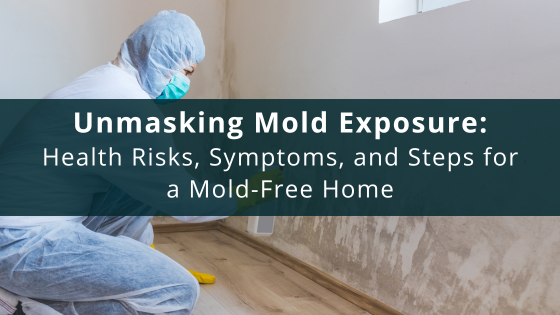In the wake of the COVID-19 pandemic, a new health crisis has emerged—Post-COVID syndrome. It afflicts a large number of people, presenting as a group of persistent symptoms for several weeks post-acute infection. Although exhaustion, mental confusion, and breathing problems are common topics of discussion. Regarding this issue, one aspect that is largely ignored is that of the sinuses. In this blog, we will examine the interconnections between post–COVID syndrome and chronic sinusitis. We will also dig into the wider implications of sinus health and provide clinical management strategies.
Understanding Post-COVID Syndrome and Chronic Sinusitis
The expression post-COVID syndrome embraces a variety of signs, including persistent nasal obstruction. It ignites insomnia and headaches with or without sinus discomfort. Many of these symptoms, when put together, are almost indistinguishable from chronic sinusitis. It is defined as inflammation of the sinus cavities spanning more than 12 weeks, commonly known as chronic sinusitis. Chronic sinusitis concerns millions of individuals across the world. It greatly impacts their way of living.
The two take up arms in terms of the inflammatory and immunological responses associated with COVID-19 infection. These tissues, mainly of the respiratory system, are the primary target of the virus. More indirectly, it can be suggested that the mucosa-containing nasal and sinus cavities can also be compromised. This raises the chances of being infected secondarily with bacteria or fungi. Thus contributing to the problem of chronic sinus disease.
How COVID-19 Affects Sinus Health
COVID-19 chiefly affects the upper airways, resulting in swelling and injury to the mucous membranes. The sinuses are reliant on effective drainage and ventilation. It becomes susceptible in cases of inflammation when these functions are impaired. Important factors connecting COVID-19 with sinus complications include:
- Mucosal Barrier Disruption: The sinus mucosa can be involved with the pathology of infection.
- Inflammatory Cascade: The infiltrating virus causes hyperactivation of immune responses. It leads to the frequent aggravation of inflammation response in the inflamed sinus cavities.
- Altered Microbiome: The pathogen, antibiotics, and steroid therapies affect the prevention of infections.
- Neurological Impact: The receptors responsible for the sense of smell are affected. Such that the patient cannot inhale anything, and hence the sinuses may also not function properly.
Chronic Sinusitis as a Comorbidity of Post-COVID Syndrome
Studies have found that chronic sinusitis shares a commonality of risk factors. Post-COVID syndrome includes immune dysfunction and allergies. A large segment of the chronic sinusitis population complains of post-COVID symptom exacerbation.
It includes the prolonged presence of nasal congestion, post-nasal drip, and pressure in the sinuses. In some of these patients, COVID-19 serves as an aggravating condition. It causes a pre-existing sinusitis to become complicated or causes a new chronic sinusitis.
The Role of Comorbid Conditions in Sinus Health Post-COVID
Conditions such as asthma, allergies, and gastroesophageal reflux disease (GERD) often coexist with chronic sinusitis. These comorbidities can worsen sinus symptoms in Post-COVID patients:
- Asthma: Exacerbated by sinus inflammation, it leads to a vicious cycle of respiratory distress.
- Allergies: Heightened sensitivity post-COVID can trigger sinus inflammation.
- GERD: Acid reflux damages sinus tissues, compounding issues.
Diagnosis and Management: A Holistic Approach
Considering the effective remedies to eliminate sinus complications among people suffering from COVID-19 would also mean the use of a multidisciplinary approach that is able to bring relief to both the acute symptoms as well as the chronic conditions whenever applicable. With the help of focused diagnostics, treatment options, and advanced techniques, healthcare workers are able to help the patients experiencing these various diseases that are linked to each other.
Comprehensive Evaluation
After COVID, the first important thing is an assessment of sinus problems. For example, nasal endoscopy along with CT scans helps to examine the structural and functional defects in sinuses in more detail. These details help visualize any obstruction, polyp, or inflammation that can be the reason for chronic complaints. In cases of recurrent or sub-acute infections, when more information is needed, next-generation sequencing comes into extreme heat.
Targeted Medical Therapies
The focus of medication is to relieve swelling and treat infections. Anti-inflammatory medication such as steroid-induced sprays or orally taken tablets plays an important role in reducing the swelling and thus aiding in the drainage of the sinuses. In the event of a bacterial or fungal infection, drugs addressing such issues are used depending on the causative organism, and the resistance patterns are critically considered so as to avoid the ineffectiveness of the drugs.
Restoring Mucosal Integrity
It is essential to keep the sinuses healthy for the longest time possible. Saline irrigations done on a regular basis help in removing mucus, clearing irritants, and promoting healing. In addition, appropriate feeding is also tenable to support the immunological response of the body. For instance, supplements such as Vitamin D and antioxidants are known to enhance barrier mucosal protection thereby minimizing the chances of incidences of repeated infections and promoting sinus health in general.
Addressing Comorbidities
When it comes to managing sinus infections, dealing with comorbidities is important in order to achieve the best results. Lifestyle adjustments with restriction of late meals, less eating of sour foods, use of preparation and other measures can help greatly reduce reflux-related problems with sinuses for patients with GERD.
Innovative Interventions
Where standard medical treatment cannot achieve the desired outcome, fresh approaches tend to bring renewed optimism. Biologics, specifically Dupilumab, for which there is clinical evidence supporting its use for chronic sinusitis with polyps or obstinate inflammation. Such biologics provide relief even in the most complex cases, as they specifically intervene in the underlying inflammatory mechanisms responsible for the condition.
Prevention: Strengthening Sinus Health Post-COVID
Preventing sinus complications after COVID-19 starts with proactive measures:
- Maintain nasal hygiene: Regular saline rinses to reduce irritants and allergens.
- Stay hydrated: Keeps mucus thin and flowing, reducing blockages.
- Manage underlying conditions: Asthma, allergies, and GERD should be well-controlled.
- Avoid smoking and pollutants: These irritants damage sinus tissues and impair recovery.
- Strengthen the immune system: A balanced diet, regular exercise, and sufficient sleep are key.
Hope on the Horizon: Emerging Research and Future Directions
New studies have come out exploring the relationship between post-COVID syndrome and sinus health, thanks to a growing demand for this topic and the bestowing of revolutionary changes in management. One of the more developed concepts is microbiome restoration therapies, which aim to restore the balance of the nasal microbiome in order to improve the health of the sinuses and prevent infections. There is also precision medicine, which aims to treat patients based on genetic and molecular data, lowering risks and improving the efficacy of all treatments.
Moreover, advanced drug delivery systems such as those that can be implanted into the body can provide continuous, localized therapy to the sinus mucosa directly, thus improving symptom control. All these advancements are likely to contribute towards better services and better outcomes, as well as create a new avenue for patients who have suffered from sinusitis complications even after COVID-19.
Final Thoughts
It is important to consider these issues because the relationship between post-COVID syndrome and sinus health is evident, and it calls for attention and management. Otherwise, it would allow patients to realize how much more they can gain out of the treatment when sinus health is emphasized within the context of post-COVID health management. For patients who still have a lot of these symptoms, it is always a relief to find health professionals who can relate these factors meaningfully. It is not only breathing that is free from obstruction that is of concern for sinus health but also the ability to live.







